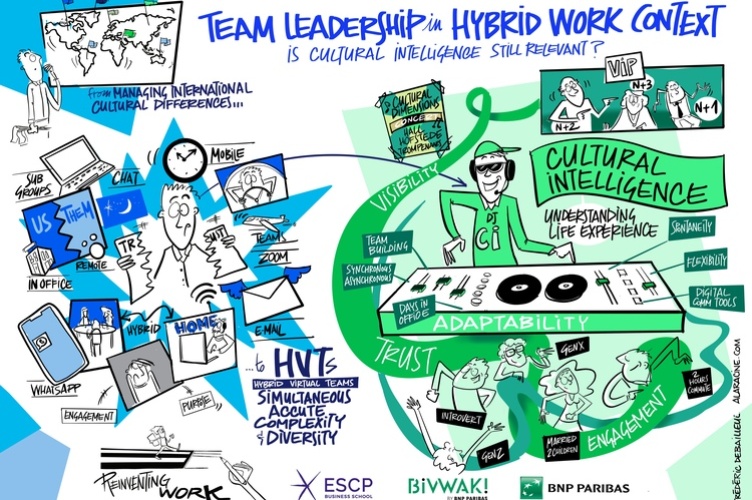Cultural intelligence & team leadership in hybrid work context A fascinating project launched in April 2024
Research context
The shift to hybrid work has reshaped traditional workplace dynamics, positioning hybrid work as a critical factor for employee attraction, retention, and productivity. As the ongoing debate between Return- To-Office and Work-from-Home shows, leading Hybrid Virtual Teams (HVTs), i.e. teams that combine a mix of Face-to-Face / in presence and virtual interactions, introduces unique challenges, including fostering engagement, cohesion, and trust, managing work-life boundaries, and addressing employee well-being.
This research investigates the impact of hybrid work on team leadership, with a focus on the role of Cultural Intelligence (CI) in effectively managing HVTs. Indeed, traditionally in global organizations, CI was seen as a critical skill for team leaders to successfully adapt to unfamiliar settings and positively influence team performance. Our study extends beyond traditional intercultural contexts to identify the key qualities and competencies team leaders need to address the unique challenges of managing HVTs. It aims to deliver actionable insights that help organizations navigate the complexities of hybrid work to foster sustainable team performance and enhance employee satisfaction.
Research question
Which leadership qualities and competencies, including Cultural Intelligence, are essential for effectively managing Hybrid Virtual Teams?
Methodology and milestones
This study employs a case-study method with semistructured interviews conducted across various entities with different implementations of hybrid work. Each entity includes 5 to 7 participants, balancing team managers and members to capture perspectives from both leadership providers and receivers. This approach allows for an in-depth exploration of hybrid work dynamics and leadership strategies across diverse cultural and operational contexts.
Interviews began in June 2024, with 30 interviews completed so far (averaging 50 minutes, in French or English) across seven BNP Paribas entities (IMEX, NIKEL, Real Estate, Finance & Strategy, Risk, IT, and Europe Méditerranée). Interviews will continue until data saturation is reached, expected by early Q1 2025.
Research team
- Isabelle Bouisse-Bloigu (ESCP, Paris campus)
- Petros Chamakiotis (ESCP, Madrid campus)
Research keytake aways
- Situational Responsiveness: Some leaders shift between hands-on and hands-off leadership styles based on corporate and operational context, hybrid work configuration, and individual team member needs. CI could be valuable to enhance their adaptability and leadership style fluidity.
- Purposeful Face-To-Face Interaction
Design: Strategically planned in person engagements strengthen team cohesion, trust, and creativity. CI could guide in defining the appropriate Face To-Face purpose and format to meet team-specific needs. - Tailoring Hybrid Work Practices: Some leaders customize hybrid work practices within policy constraints, aligning with roles, team life cycles, and hierarchy dynamics. Leveraging CI could help this process balance operational efficiency and relational harmony.
Next steps
We will continue interviewing until we reach saturation (i.e. when interviews do not yield new insights) which we expect for early Q1 2025, probably reaching at around 45 interviews in total. In parallel, we will transcribe, anonymize, and analyze the data gathered. We target to submit our work at academic conferences during early Q2 2025 and present our findings during those avenues and preparing for journal publications in Q3 2025.
Key outcomes
Published academic papers
■ Provide insights to HR and Learning and Development managers to develop and justify potential hybrid-specific trainings (including but not limited to CI).
■ Propose actionable strategies via frameworks or “best practices” for e-leaders and team members to leverage CI and key competencies to adapt leadership and communication styles, resolve conflicts, foster trust and engagement, and design hybrid team configurations that enhance cohesion, creativity, and performance.
Campuses
